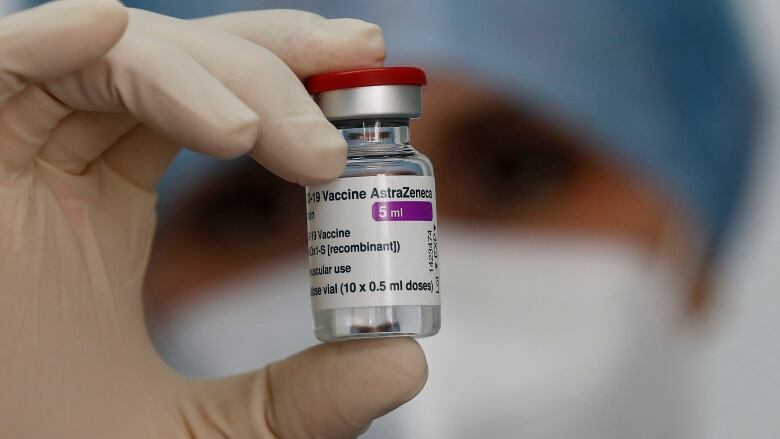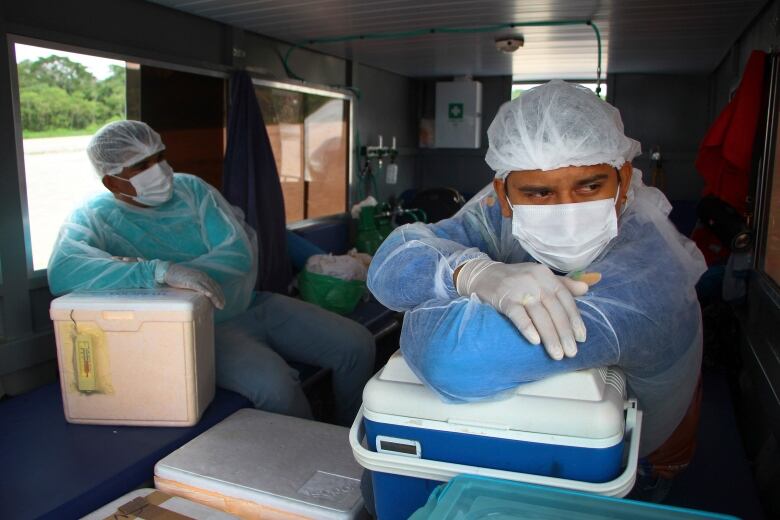Why AstraZeneca vaccine approval in Canada may open more doors
Advantages to having multiple vaccines available, doctors say

Health Canada's approval of the AstraZeneca-Oxfordvaccine and the Serum Institute of India's version of it to prevent COVID-19 in adults follows similar green lights from regulators in the United Kingdom, Europe Union, Mexico and India.
The AstraZeneca-Oxford vaccine, called ChAdOx1, was approved for use in Canada on Feb. 26following clinical trials in the United Kingdom and Brazil that showed a 62.1per cent efficacy in reducing symptomatic cases of COVID-19 cases among those given the vaccine. Experts have said any vaccine with an efficacy rate of over 50 per cent could help stop outbreaks.
Dr. Supriya Sharma, Health Canada's chief medical adviser, said the key number across all of the clinical trials for those who received AstraZeneca's product was zero no deaths, no hospitalizations for serious COVID-19 and no deaths because of an adverse effect of the vaccine.
"I think Canada is hungry for vaccines," Sharma said in a briefing. "We're putting more on the buffet table to be used."
On March 22, AstraZenecaput out a news release announcing itsvaccineprovided strong protection against COVID-19 in a large clinical trial in the United States.
Dr. Christopher Labos, a cardiologist in Montreal with a background in epidemiology, called the U.S. data reassuring.
"It is sort of just adding to the data suggesting that this vaccine does work, that it works in all age groups."
Dr. Susy Hota, medical director of infection prevention and control at Toronto's University Health Network, called it a positive move to have AstraZeneca's vaccineadded to Canada's options.
"What we need to be focusing on is trying to get as many people as possible vaccinated so we can prevent the harms from this," Hota said.
Canada has an agreement with AstraZeneca to buy 20 million doses as well as between 1.9 million and 3.2 million doses through the global vaccine-sharing initiative known as COVAX.
WATCH | AstraZeneca vaccine overview:
Canada will also receive twomillion doses of AstraZeneca's COVID-19 vaccine manufactured by the Serum Institute of India and a loan of 1.5 million doses from the U.S.
Here's a look at some common questions about the vaccine, how it works, in whom and how it could be rolled out.
What's different about this shot?
The AstraZeneca-Oxford is cheaper and easier to handle than the mRNA vaccines from Pfizer-BioNTech and Moderna, which need to be stored at ultracold temperatures to protect the fragile genetic material.
AstraZeneca says its vaccine can be stored, transported and handled at normal refrigerated conditions (2 to 8 C) for at least six months. (Moderna's product can be stored at refrigeration temperatures for 30 days after thawing.)
The ease of handling could make it easier to administer AstraZeneca's vaccine in rural and remote areas of Canada and the world.
"There are definitely some advantages to having multiple vaccine candidates available to get to as many Canadians as possible," Hota said.
Sharma said while the product monograph notes that evidence for people over age 65 is limited, real-world datafrom countries already using AstraZeneca's vaccine suggest it is safe and effective among older age groups.
Data from clinical trials is more limited compared with in real-world settings that reflect people from different age groups, medical conditions and other factors.
How does it work?
Vaccines work by training our immune system to recognize an invader.
The first two vaccines to protect against COVID-19 that were approved for use in Canada deliver RNA that encodes the spike protein on the surface of the pandemic coronavirus.

In contrast, the AstraZeneca vaccine packs the genetic information for the spike protein in the shell of a virus. Vaccine makers altered the adenovirus so it can't grow in humans.
Viral vector vaccines mimic viral infection more closely than some other kinds of vaccines. One potential disadvantage of viral vectors is that if a person has immunity toward a particular vector, the vaccine won't work as well.
AstraZenecais working on reformulating its vaccine to address more transmissible variants of coronavirus.
How and where could it be used?
Virologist Eric Arts at Western University in London, Ont., said vaccines from AstraZeneca-Oxford, Johnson & Johnson, which is also approved for use in Canada, and the Russian Sputnik-V vaccineall have some similarities.
"I do like the fact that AstraZeneca has decided to continue trials, to work with the Russians on the Sputnik-V vaccine combination," said Arts, who holds the Canada Research Chair in HIV pathogenesis and viral control.

"The reason why I'm encouraged by it is I think there might be greater opportunity to administer those vaccines in low- to middle-income countries. We need that. I think our high-income countries have somewhat ignored the situation that is more significant globally."
WATCH | Performance of AstraZeneca'sCOVID-19 vaccine so far:
With files from CBC's Amina Zafar, Emily Chung, Reuters and The Associated Press














_(720p).jpg)


 OFFICIAL HD MUSIC VIDEO.jpg)
.jpg)



























































































